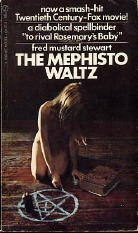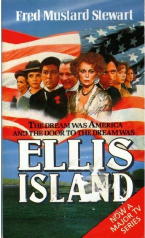Mon 12 Feb 2007
Obituary: FRED MUSTARD STEWART (1932-2007)
Posted by Steve under Authors , Crime Fiction IV , Obituaries / Deaths Noted[7] Comments
Unlikely to be recognized as a crime fiction novelist by many, even perhaps by himself, author Fred Mustard Stewart died last Wednesday at his home in Manhattan.
His entry in Allen J. Hubin’s Crime Fiction IV is admittedly meager, but it’s certainly enough to warrant a tribute here. (Thanks to the comment left by his nephew Brough Stewart, his year of birth has been corrected to 1932 from 1936, as was originally given.)
* * The Mephisto Waltz (Coward, 1969, hc) [New York City, NY] Joseph, 1969. Film: TCF, 1971 (scw: Ben Maddow; dir: Paul Wendkos).
* * -The Methuselah Enzyme (Arbor, 1970, hc) [Switzerland] Joseph, 1971.
* * -A Rage Against Heaven (Viking, 1978, hc) [1800s] Hutchinson, 1978.
Regarding that one definite entry (the dashes indicating that the other two are only marginally crime-related), his obituary in the New York Times goes on to say:
The last line gives it all away. The tale should be be categorized more precisely as a horror novel, more related to Rosemary’s Baby than to Sherlock Holmes — and to be sure both the book and the film based upon it were marketed that way.

From the archives of the New York Times, here are the opening sentences of a review written by Howard Thompson, published April 10, 1971:
“The sensible wife, who squares off early with the old musician’s horrible dog, expects and gets the worst, with a couple of murders. Add some angular photography and a spooky, haunted-house score …”
A complete bibliography for Mr. Stewart can be found online here. He will perhaps be best remembered for what the Times calls his “multi-strand family narratives,” of which one entitled Ellis Island (Morrow, 1983) may be as representative as any. The novel follows the lives of “five young penniless people who came to America at the turn of the century — a land of shining hope and breathtaking challenge. They came to fulfill a glowing promise and take the fearful gamble of a new life in a land where anything was possible.”

Ellis Island was made into a television mini-series on CBS in 1984, a Golden Globe winner for Faye Dunaway (Best Supporting Actress) and recipient of several Emmy nominations.
February 13th, 2007 at 11:12 pm
Thanks for the obituary on my uncle, Fred Mustard Stewart. However, he was born in 1932, not 1936 as indicated.
February 21st, 2007 at 3:08 pm
Hi:
I’d love to find on original of this:
“The publicity materials for the book (The Mephisto Waltz) included a 45-r.p.m. recording of Mr. Stewart playing the title piece, by Liszt.”
Steve
>> You’re certainly right about that. If there’s any place it would show up, it would be eBay. I don’t know if it would go for much — but then again, if two people saw it and both wanted it badly enough, who knows how high it would go? –Steve
March 3rd, 2007 at 12:30 pm
I just read with surprise about the death of Mr. Stewart. What is so bizarre is that I am in the process of rereading all of his books as I had not done so for the past 20 years. Since I live close to NYC, I had also thought of possibly getting one signed but unfortunately, this is now not a possibility.
Does anyone know where we can send his wife, Joan a condolence message?
March 29th, 2007 at 10:15 pm
Howard, I would be happy to forward a message to Joan.
September 13th, 2008 at 5:18 pm
I want to write of my family history and my eye was caught on “Ellis Island” in the library where it was on display. That was my initiation to Mr. Stewart’s works. I have since read “Pomp & Circumstance”, “Titan”, and currently am reading “Century”. I decided to look him up on the Internet, and I am sure you can understand my sadness when I realized he had died last year. I wish I had known of him sooner and could have told him how much I admired his work. Please pass on my condolences to his wife, Joan.
Sincerely,
Geraldine Snow
September 14th, 2008 at 9:26 pm
I have passed the message on to Fred’s wife Joan. She will appreciate the condolences and your appreciation of his work. I grew up reading his books because he was my uncle, but would have loved them anyway.
March 30th, 2014 at 8:17 pm
I used to work for Joan Stewart and would love to talk with her again. is there a way I can get a message to her?